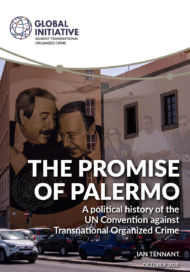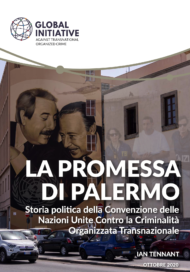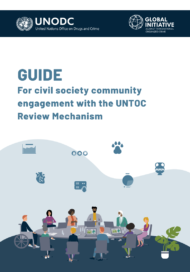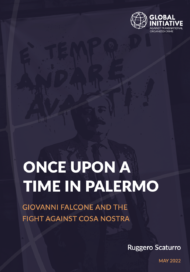The aim of this report is to ensure that the political story of the UN Convention against Transnational Organized Crime (UNTOC) is not forgotten, and that those making policy now and in the future do not understand it through the current political debates and structures only.
A key insight from the history of the Convention is that those who created it understood very well the threat that organized crime poses to security, sovereignty, human rights and development, and worked together to create a new response to those threats within the context of the political space available to them. Unfortunately, these threats remain and grow stronger, despite the advances made by the creation of the Convention. The geo-political context has also changed dramatically, further challenging the ability of the Convention to achieve its aims. This report investigates how the UNTOC became reality and calls on current and future generations to be inspired and informed by these efforts and to make further progress towards comprehensively countering the dominance and power of organized criminals.
Lo scopo di questo studio è garantire che la storia politica della Convenzione non sia dimenticata, e che coloro che fanno politica oggi e in futuro non la interpretino solo attraverso i dibattiti e le strutture politiche attuali.
Un concetto fondamentale della storia della Convenzione si ritrova nel fatto che coloro i quali l’hanno creata hanno compreso molto bene la minaccia che la criminalità organizzata rappresenta per la sicurezza, per la sovranità, per i diritti umani e lo sviluppo, e hanno lavorato insieme per creare una nuova risposta a tali minacce nel contesto dello spazio politico a loro disposizione.
Sfortunatamente, queste minacce persistono e si rafforzano, nonostante i progressi compiuti dalla creazione della Convenzione. Anche il contesto geopolitico è cambiato radicalmente, mettendo ulteriormente alla prova la capacità della Convenzione di raggiungere i suoi obiettivi.
In questo studio si indagano le modalità in cui l’UNTOC è diventata realtà, con l’invito alle generazioni presenti e future a farsi ispirare e informare da questi sforzi, nonché a compiere ulteriori progressi per contrastare totalmente il dominio e il potere della criminalità organizzata.





